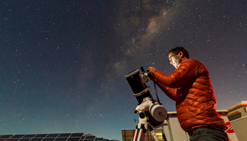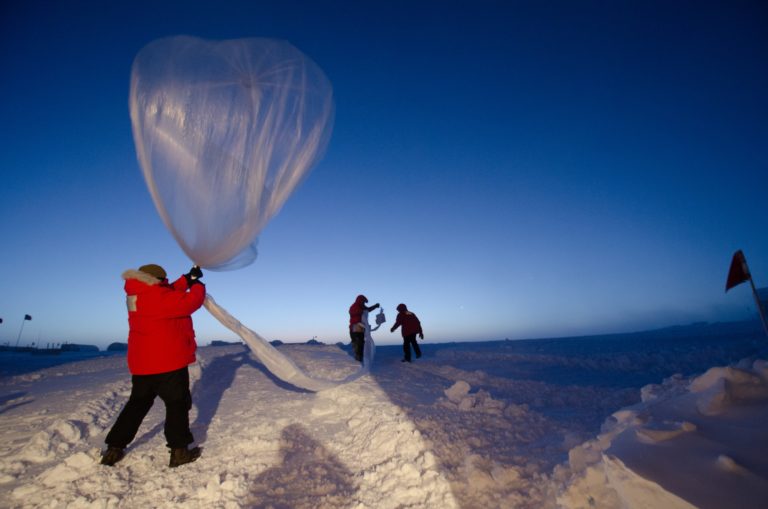In STEM, astronomy is a science that seeks to explain everything that we observe in the universe, from the comets and planets in our own solar system to distant galaxies to the echoes of the Big Bang. By studying the cosmos beyond our own planet, we can understand where we came from, where we are going, and how physics works under conditions which are impossible to recreate on Earth.
Astronomy is the study of everything in the universe beyond Earth’s atmosphere. That includes objects we can see with our naked eyes, like the Sun, the Moon, the planets, and the stars. It also includes objects we can only see with telescopes or other instruments, like faraway galaxies and tiny particles.
Astronomy is a natural science that studies celestial objects and phenomena. It uses mathematics, physics, and chemistry in order to explain their origin and evolution.

Education Requirements
Doctoral degree
Average Salary
$110k
Planetary astronomers study planets and planetary bodies like natural satellites, comets and asteroids. They use a variety of equipment to amass information, from telescopes to view distant objects to laboratory paraphernalia to study meteorites and extraterrestrial particles. Their work helps us better understand the life cycle of planets and other astronomical bodies as well as Earth and our own solar system.
Skills Needed
Astronomers of any specialty generally have doctorate-level degrees in astronomy or physics after completing bachelor’s and master’s degrees. Most spend their careers in a university setting, research facilities like observatories or laboratories, or government agencies. Astronomers should have outstanding knowledge of physics and mathematics. Most astronomers are also very observant and analytical. Much of their work is done with computers, and they’re expected to be able to communicate their findings effectively.

Education Requirements
Doctoral degree
Average Salary
$110k
Solar astronomers study the closest star to our planet: the sun. They study its layers, its characteristics and even its anomalies from the relatively close vantage point of Earth as well as through data obtained from solar probes. Special telescopes allow solar astronomers to observe the sun’s light in and outside of the visible spectrum. The information solar astronomers gather contributes to the understanding of other stars and systems.
Skills Needed
Solar astronomers will typically have a doctorate degree following bachelor’s and master’s degrees. Solar astronomers may work for laboratories, engineering firms, aeronautical companies, government entities or institutions of higher learning. They spend much time working on computers to report and analyze data, and they should also be effective communicators.

Education Requirements
Doctoral degree
Average Salary
$110k
Stellar astronomers study individual stars’ life cycles and composition as well as star clusters and galaxies. They use tools like optical and radio telescopes to measure luminosity, visible light and stellar radiation, and also classify stellar bodies. The work of stellar astronomers helps us better understand the workings of the universe and is also provides important information for space exploration.
Skills Needed
Stellar astronomers usually will have earned bachelor’s, master’s and doctorate degrees, and they may also spend several years in a postdoctoral position at a university. They will likely find employment in educational, government, private sector or military facilities and should be analytical, detailed and patient, with good computer literacy and communication skills.

Education Requirements
Doctoral degree
Average Salary
$92k
Astrophysicists study the universe, including how it began and how it has evolved. Like other physicists, they consider matter and universal laws, but with a focus on outer space and astronomical observations. They develop, research and test theories; contribute data and research; and analyze and create tools and programs to support research.
Skills Needed
Astrophysicists will have at least a master’s degree, although a doctorate is typically required by employers such as educational institutions or governmental entities. Secondary education programs will focus on higher-level math and science. Aspiring astrophysicists should have excellent communication skills as well as outstanding research, analytical and problem-solving abilities.

Education Requirements
Bachelor's degree
Average Salary
$74K
Aeronautical engineers are involved in designing, developing, testing and producing aircraft and aircraft support systems. By contrast, astronautical engineers focus on spacecraft like satellites, shuttles and rockets. Aeronautical engineers may work for manufacturers, government agencies, engineering firms and other employers in general careers or specialties like instrumentation or navigation.
Skills Needed
Aeronautical engineers typically need a bachelor’s degree to enter the field. Excellent math skills are needed along with outstanding analytical and critical thinking ability. Computer programming is an increasingly valuable skill for aeronautical engineers with respect to the complex software used in the modern aviation industry.

Education Requirements
Doctoral degree
Average Salary
$73k - $81k
Cosmologists are scientists who study the universe’s physical structure, history and future, objects, and phenomena. Cosmology is considered a branch of astrophysics. Cosmologists use data gathered by telescopes and satellites and create computer models to share their theories about the universe, from the Big Bang to its ultimate demise. Cosmologists typically work at universities or for government agencies like NASA, and the field is considered to be highly competitive.
Skills Needed
Cosmologists will have earned bachelor’s, master’s and doctorate degrees before entering the field, and they typically have been involved in intensive internships and postgraduate study. They not only need to be skilled in advanced mathematics, but also adept at using specialized computer programs for data gathering and analysis.

Education Requirements
Bachelor's degree
Average Salary
$73k
Galactic astronomers study our Milky Way galaxy’s matter, astronomical objects and phenomena. Extragalactic astronomers study galaxies outside the Milky Way and everything in between. Astronomers usually work in scientific research facilities for governmental entities, universities or the private sector.
Skills Needed
Some entry-level positions are available with just a bachelor’s degree, but most astronomy jobs will require master’s or doctorate degrees. Successful astronomers typically are critical thinkers with a great deal of attention to detail and precision.

Education Requirements
Bachelor's degree
Average Salary
$82k
Astronauts are trained to serve aboard a spacecraft. Although commercial space travel is an emerging sector, U.S. astronauts are generally associated with NASA (National Aeronautics and Space Administration), the government agency responsible for space travel. Modern astronauts may be assigned to short stints or longer-term assignment to the International Space Station and future Mars missions.
Skills Needed
Civilian and military personnel with flight experience can apply to become NASA astronaut candidates. A candidate must be a U.S. citizen with a bachelor’s degree in engineering, biological science, physical science or mathematics; they must also pass rigorous physical fitness tests. Key personality traits for astronauts include resiliency, high emotional stability and diligence.

Education Requirements
Bachelor's degree
Average Salary
$64k
Astrobiologists study the possibility of life beyond Earth through the understanding of how life as we know it originates and survives. Much of an astrobiologist’s work focuses on how organisms flourish in adverse conditions—such as temperature or geochemical extremes or radiation exposure—right here on Earth. The study of astrobiology, a relatively new field, includes aspects of biology, geology and astronomy.
Skills Needed
Master’s or doctoral degrees are required for advanced positions, but some astrobiologists can enter the field with a bachelor’s degree. Aspiring astrobiologists should be inquisitive, with patience and the ability to extrapolate data gleaned from detailed observation and analysis.

Education Requirements
Bachelor's degree
Average Salary
$84k
Planetarium directors oversee the operations of a planetarium, a domed theater that features educational presentations on the sky and astronomy. Planetariums are generally meant to enhance the public’s appreciation of astronomy, the universe and our home planet. Directors may develop programming, manage staff, and coordinate outreach to community groups and the public.
Skills Needed
Planetarium directors have typically earned a bachelor’s degree followed by a master’s or doctoral degree in astronomy, astrophysics or a related field. They should have good interpersonal and management skills, and multitasking ability—especially at smaller institutions with limited staff—is highly desirable.

Education Requirements
Bachelor's degree
Average Salary
$100k
Physicists are scientists who study matter and energy from sub-atomic and particle physics to the universe as a whole. Career physicists are typically employed by academic institutions, laboratories or private industries. They may work with engineers on applied development and design in industrial settings; or research and teach in university settings.
Skills Needed
Physicists can enter the field with a bachelor’s degree for basic laboratory positions, but most career paths require master’s and doctorate degrees. Aspiring physicists should have excellent mathematical ability, an inquisitive nature, perseverance and keen observation skills.

Education Requirements
Bachelor's degree plus teaching certificate
Average Salary
$49k - $100k
Science teachers specialize in teaching science curriculum at the elementary, middle-school or high-school level. They generally focus on fundamental science in lower grades but may specialize in a particular science such as biology or chemistry, sometimes for college-bound students, in high school. Science teachers work for both public and private school systems.
Skills Needed
A bachelor’s degree in a science field plus a teaching certificate is typically required to teach in public schools, although many teachers pursue master’s degrees to broaden their career opportunities and increase income potential. A successful science teacher is not only extremely knowledgeable about their subject matter, but also motivated to help students gain a useful understanding of science. Science teachers should be organized and work well with youth.

Education Requirements
Bachelor's degree
Average Salary
$98k
Meteorologists are scientists who study, analyze, observe and forecast weather conditions like temperature, precipitation, and wind currents. They use data from a variety of instruments and tools including thermometers and barometers, rain gauges, weather satellites and radar. Meteorologists work for private companies as well as military and government entities.
Skills Needed
Meteorologists have a bachelor’s degree at minimum, but certain employers may require a postgraduate degree. Successful meteorologists have excellent math and science skills and are methodical and attentive to detail. Meteorologists should also have good communication skills.

Education Requirements
Bachelor's degree
Average Salary
$152k
Climatologists study weather patterns over time to determine climate variability and climate change and their long-term effects on such elements as vegetation, water resources and the environment. They typically collect current and historical data—which may include field studies—and use computer models to make climate predictions. Job opportunities range from teaching to private consulting to working for governmental agencies.
Skills Needed
A bachelor’s degree is the minimum educational requirement for a climatologist; a master’s or doctorate degree is necessary for some positions. Climatologists should not only have mastery of the scientific tools and technology used in the sector, but also have good critical thinking and problem-solving skills.

Education Requirements
Bachelor's degree
Average Salary
$57k
Technical writers create documentation such as maintenance manuals and user guides, typically working closely with engineers and other tech personnel throughout the writing and editing process. They may work for engineering firms or manufacturing companies. Technical writers may start as general writers and later pursue a technical communication specialty through additional education or on-the-job training.
Skills Needed
Technical writers typically need a bachelor’s degree to enter the field. Not only do they need exceptional writing skills, but they should also understand technical concepts so they can successfully communicate complex information to end-users

Education Requirements
Average Salary
$47k
Science journalists specialize in science content for news and general-interest media sources as well as industry channels including print, broadcast and online sources. Science journalists may begin a career as a scientist and transition to science journalism, or may begin as journalists who later specialize in science content.
Skills Needed
Depending on the career path, science writers have at least a bachelor’s degree in a science field with journalism training or a bachelor’s degree in journalism with special study in science. They should have exceptional writing skills as well as thorough knowledge of their area of specialty.
Career salary data provided by: U.S. Bureau of Labor Statistics Occupational Outlook handbook and O*NET OnLine.